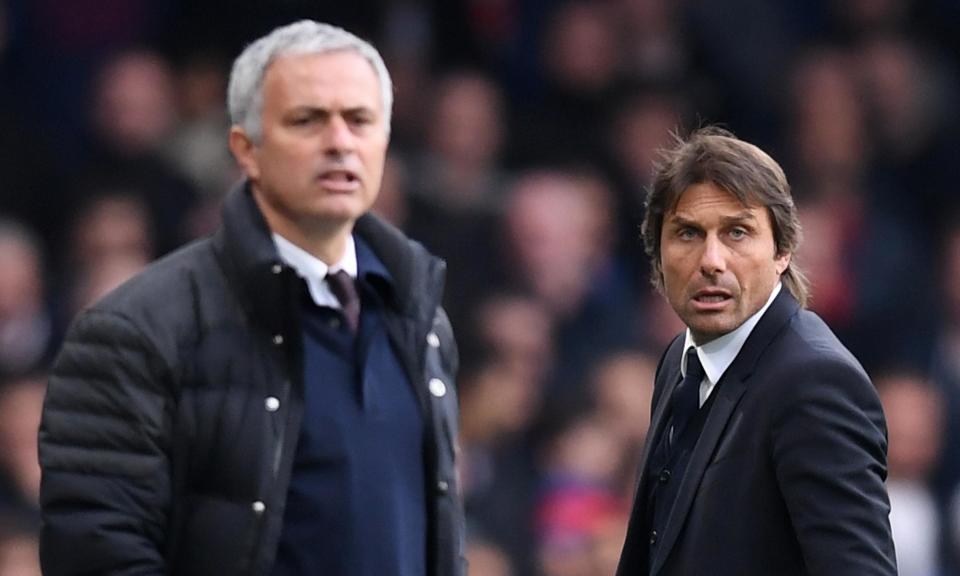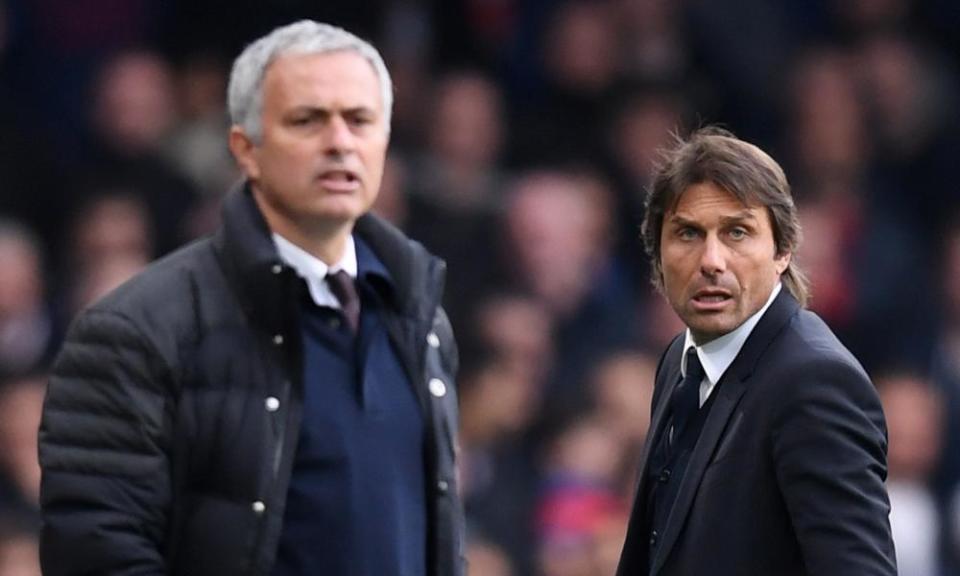Antonio Conte's unassuming Chelsea management has put Jose Mourinho in the shade
In Italy, they know it isn’t actually true that Antonio Conte – contrary to the impression he might have given during his first season at Chelsea – is immune to the kind of sniping that leaves the distinct impression he has already burrowed his way under José Mourinho’s skin.
Those who remember Conte’s work at Juventus might certainly be surprised by his newly acquired restraint given he previously had a habit of taking great offence, with hair‑trigger sensibilities, when managers or pundits talked about his team, even sometimes if what they said might have seemed perfectly innocuous.
Pep Guardiola found that out in Conte’s last season in Serie A when he floated the idea that the Italian had put together a side capable of winning the Champions League.
Conte, for some inexplicable reason, took it as an affront, as though he were being accused of chequebook glory and launched into an impassioned defence of how little he had spent compared with other managers, not least Guardiola at Bayern Munich. Guardiola, he concluded, must be “stuck in his time at Brescia or doesn’t know that Bayern have just spent 70 million strengthening the best team in Europe”.
READ MORE: Chelsea reunion is Mourinho's chance to prove he is still the big-game boss

Nor was that a one-off. Conte once accused Rafael Benítez, then at Napoli, of “talking rubbish”. He has quarrelled with Fabio Capello, a man regarded as football royalty in Turin, and would not even acknowledge Walter Mazzarri, Benítez’s predecessor, when Napoli were challenging Juventus for the Serie A title. Mazzarri had written in his autobiography about how the two teams operated with similar systems and Conte, again, took it badly, believing he was being accused of copying.
“I never spoke to him,” Conte said after one game at the Stadio San Paolo. “Never, never, never. We didn’t even shake hands. I can assure you we didn’t even look at each other. Each to their own bench. It’s better that way.”
If this sounds a world away from Conte’s public utterances at Stamford Bridge, it is also worth recalling his reaction after Juve’s 1-1 draw against Milan in 2012.
Sulley Muntari’s header had crossed the goalline without the referee awarding a second Milan goal and, in the studios of Sky Italia, their former player Zvonimir Boban was castigating the decision. Conte, wired up from San Siro, didn’t like what he heard. Boban, he snapped, should “take off his [Milan] shirt before making certain comments”.
So far, there has been none of this at Chelsea. Conte was a reluctant participant in that little piece of touchline theatre earlier this season, when Mourinho took exception to the Italian’s celebrations, and has been reluctant ever since to prolong the argument. He has not been goaded by Mourinho’s pithy observations about Chelsea’s style of play and, as tempting as it might be sometimes to return fire, it is probably advisable to maintain the air of detached cordiality.
Conte has no need to get involved in public tit‑for‑tat. He has won the battle already. And that, almost certainly, is what stabs at Mourinho’s ego more than anything.
A manager does not get extra points for good behaviour but it has certainly been easy to warm to Conte when he has deliberately removed himself from the kind of controversies that have attached themselves to other managers. Not once has he turned on a referee, or belittled a journalist, or introduced any kind of unpleasantness.
There have been no summonses from the Football Association’s disciplinary unit. No touchline bans, no kicked water bottles, no aggro, no back-page photographs of him screaming into the face of the fourth official. Chelsea, post-Mourinho, have found a manager who has removed the permanent threat of rancour, in the same way that Manchester City turned to Manuel Pellegrini after cutting their ties with Roberto Mancini. And perhaps Chelsea deserve some credit, too. If Conte has made an effort to change, it is because his club are tired of the imaginary wars and more conscious of their public image than many people realise.
They still have their moments and, Mourinho being Mourinho, he won’t have missed that little jibe on Chelsea’s website paying attention to Manchester United’s unbeaten run in the league, stretching back to October, and the way it had “lifted them all the way from sixth to sixth”. For the most part, though, the needling has come the other way.
According to Mourinho, Chelsea are now a fundamentally defensive team who operate with the kind of tactics that would not be tolerated at his own club. But how can that possibly be true when Chelsea’s goals total this season, 57, is four more than the nearest two sides, Tottenham and Manchester City, have managed, three higher than Arsenal’s number and 18 better than the team Mourinho will bring to Stamford Bridge on Monday in the FA Cup quarter-finals. Only one club, Liverpool, have scored more times than Chelsea and Mourinho, of all people, should know how irritating it can be when tactical acumen is depicted as a lack of adventure. Perhaps, indeed, that is why he says it.
Yes, Conte’s men tend to sit back, trying to catch opponents on the break, but there is actually something exhilarating about a team of counterattacking specialists when the chase is on and the game has clicked into its highest gear. Eden Hazard’s goal at West Ham last Monday was a case in point. Arsenal, Liverpool and Manchester United have all played on the break. Or perhaps you might recall the Real Madrid team from a few years ago who were commonly described as the best counterattacking side on the planet – and who was manager at the time (clue: Portuguese, won a few trophies, slightly full of himself).
Mourinho’s problem is also one of the reasons why he is such a formidable opponent, namely that he doesn’t like being outdone by anyone, and unfortunately for him the results this season make a compelling case on behalf of the Italian. Chelsea, 10th last season (or 16th when Mourinho was sacked), are 10 points clear in the Premier League. The title race has become a procession and Mourinho is little more than a speck in the distance. However it is dressed up, Conte has outdone him in every department, from A to Z.
This is not to denigrate Mourinho’s first season in Manchester, when his team’s league position does not quite tell the full story about the way he has freed the club from Louis van Gaal’s tactical straitjacket. He is correct, too, when he says that Chelsea have a much more straightforward fixture list, free of European assignments. Yet the irony is that is because they did so badly last season under his guidance.
The transformation of the hitherto peripheral Victor Moses is just one example of Conte’s restorative qualities. David Luiz, the player Gary Neville once described as a PlayStation footballer, has been reinvented. Pedro has become the player Chelsea wanted him to be. Hazard, once again, is playing at the point of maximum expression and Diego Costa quickly found out behind the scenes that Conte bends for nobody. Costa’s training‑ground strop and transfer-window dalliances with China’s super‑rich could conceivably have sabotaged Chelsea’s season if the manager did not have the personality to smooth everything over. Conte swatted away the potential crisis like a man dealing with a bothersome fly.
This is why, however appealing it is to make a case for Burnley’s Sean Dyche, it is difficult to see beyond Conte when it comes to identifying the managerial performance of the season in England’s top division.
Conte has also reached this stage having spent significantly less than Mourinho and – a point that is often overlooked – he had six fewer weeks to prepare last summer because of Italy’s involvement in Euro 2016. Yet there are 17 points between the side at the top of the league and the one in sixth. United have not been that far behind at the 27-game mark of any season since 1990-91. For a man with Mourinho’s self-regard, of course it needles.
Suárez skulduggery sours the fairytale
Barcelona’s 6-1 dismantling of Paris Saint‑Germain in the Champions League is being heralded as possibly the great comeback of all-time and it is easy to understand the sense of awe when no team has ever pulled off such a feat of escapology in Europe’s premier club competition.
On that basis, it might risk allegations of being a terrible spoilsport therefore to argue that it was difficult to join in with all the eulogies when one of the origins of Barça’s victory came in the form of flagrant cheating.
By now, we should probably know better than to expect anything else from Luis Suárez when he has shown, time and again, that as soon as he pulls on a football shirt he is to be regarded as being as trustworthy as a rattlesnake wearing a silencer. All the same, it does stick in the craw that Barcelona’s fifth goal came from the former Liverpool player not only engineering his own fall inside the penalty area but going down holding his throat in a severe case of pretend agony.
This was not even his most pronounced dive of the evening, given that he had already been booked for fishing out his leg in the penalty area – twice, in fact – in the forlorn hope that the nearest opponent might conveniently give him a tap. Suárez was booked for the first con and, if there were any justice, he would have been sent off when he tried it on again. Barcelona would be out of the competition. Unai Emery, the PSG coach, would not be about to lose his job.
This, of course, does not fit into the narrative of a great football story and perhaps that explains why various television pundits used words such as “clever” to describe what had happened, or decided they should ignore it altogether.
So, yes, call me a spoilsport, but count me out when it comes to nominating Barça’s victory as the greatest comeback in football history. They say Suárez is a nice man off the pitch; on it, he also has the soul of a pickpocket.

 Yahoo Sport
Yahoo Sport 









































